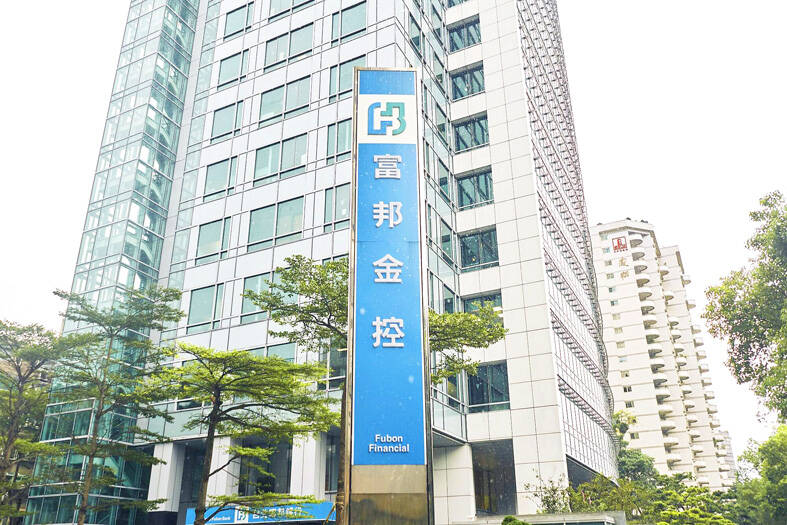Fubon Financial Holding Co (富邦金控) yesterday reported a net income of NT$30 billion (US$911.3 million) for the first two months, up 34 percent year-on-year, with earnings per share of NT$2.2.
The company attributed the performance to interest income, capital gains and dividends from its investment holdings, saying it would adopt a quick and dynamic hedging approach amid currency volatility.
It also realized capital gains from its share holdings at home and abroad last month, as the TAIEX experienced sharp fluctuations and US bond prices climbed and yields declined, it said.

Photo: An Rong Xu, Bloomberg
Fubon Life Insurance Co (富邦人壽), a company subsidiary, raised its position in US government bonds to enhance recurring income and mitigate market fluctuations, it added.
Fubon Life accumulated net income of NT$18.18 billion in the first two months, expanding 36 percent from a year earlier, after first-year premiums to NT$25.1 billion, Fubon Financial said, adding that total premiums rose 13 percent to NT$69.7 billion.
At the same time, Taipei Fubon Commercial Bank (台北富邦銀行) posted a new high for net profit at NT$7.05 billion, or a pickup of 22 percent year-on-year, driven by strong core business operations.
Its net interest income and fee income saw a growth of 10 percent and 20 percent respectively, Fubon Financial said.
The company added that it would adopt a quick and dynamic hedging approach amid currency volatility.
The New Taiwan dollar weakened against its US counterpart last month, but the trajectory has been different so far this month, it said.

TAKING STOCK: A Taiwanese cookware firm in Vietnam urged customers to assess inventory or place orders early so shipments can reach the US while tariffs are paused Taiwanese businesses in Vietnam are exploring alternatives after the White House imposed a 46 percent import duty on Vietnamese goods, following US President Donald Trump’s announcement of “reciprocal” tariffs on the US’ trading partners. Lo Shih-liang (羅世良), chairman of Brico Industry Co (裕茂工業), a Taiwanese company that manufactures cast iron cookware and stove components in Vietnam, said that more than 40 percent of his business was tied to the US market, describing the constant US policy shifts as an emotional roller coaster. “I work during the day and stay up all night watching the news. I’ve been following US news until 3am

UNCERTAINTY: Innolux activated a stringent supply chain management mechanism, as it did during the COVID-19 pandemic, to ensure optimal inventory levels for customers Flat-panel display makers AUO Corp (友達) and Innolux Corp (群創) yesterday said that about 12 to 20 percent of their display business is at risk of potential US tariffs and that they would relocate production or shipment destinations to mitigate the levies’ effects. US tariffs would have a direct impact of US$200 million on AUO’s revenue, company chairman Paul Peng (彭雙浪) told reporters on the sidelines of the Touch Taiwan trade show in Taipei yesterday. That would make up about 12 percent of the company’s overall revenue. To cope with the tariff uncertainty, AUO plans to allocate its production to manufacturing facilities in

Six years ago, LVMH’s billionaire CEO Bernard Arnault and US President Donald Trump cut the blue ribbon on a factory in rural Texas that would make designer handbags for Louis Vuitton, one of the world’s best-known luxury brands. However, since the high-profile opening, the factory has faced a host of problems limiting production, 11 former Louis Vuitton employees said. The site has consistently ranked among the worst-performing for Louis Vuitton globally, “significantly” underperforming other facilities, said three former Louis Vuitton workers and a senior industry source, who cited internal rankings shared with staff. The plant’s problems — which have not

TARIFF CONCERNS: The chipmaker cited global uncertainty from US tariffs and a weakening economic outlook, but said its Singapore expansion remains on track Vanguard International Semiconductor Corp (世界先進), a foundry service provider specializing in producing power management and display driver chips, yesterday withdrew its full-year revenue projection of moderate growth for this year, as escalating US tariff tensions raised uncertainty and concern about a potential economic recession. The Hsinchu-based chipmaker in February said revenues this year would grow mildly from last year based on improving supply chain inventory levels and market demand. At the time, it also anticipated gradual quarter revenue growth. However, the US’ sweeping tariff policy has upended the industry’s supply chains and weakened economic prospects for the world economy, it said. “Now